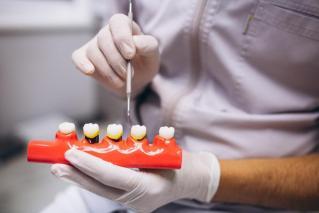Year after year, veneers remain one of the most popular dental treatments. Are you wondering if veneers can improve your smile? Stefanie Sunnes, DMD, at Alegria Dental Care in Houston wants you to be aware of your options. Below is an in-depth look at five reasons you should consider dental veneers.
1. Veneers take less time than orthodontic treatment
If you have gaps between your teeth, or if your teeth are crooked, you might need years of expensive orthodontic treatment to fix them. However, if your concern is mostly cosmetic rather than functional, veneers can give you a faster, cheaper solution. Veneers can fill gaps and give the appearance of straight teeth quickly.
2. Veneers can cover chips and cracks
One of the most common uses for veneers is to cover chips and cracks in your teeth. Veneers, which are usually cheaper than crowns, can provide a similar restoration cosmetically. Additionally, veneers can help strengthen teeth that have cracks and help prevent further cracking. Furthermore, unlike crowns, which can require much of your tooth’s enamel to be filed down, a veneer can be placed with minimal loss of your tooth’s enamel.
3. Veneers can make teeth white when bleaching won’t work
If you’re looking for a brighter smile, that usually means bleaching your teeth. However, there are some situations when bleaching won’t work. For these situations, veneers can provide a safe alternative.
Veneers may be a better option than bleaching if you have deep stains in the dentin of your teeth, which can be caused by tooth damage, excessive exposure to fluoride, or exposure to tetracycline antibiotics at a young age. Your dentin can also discolor as you age.
Dr. Sunnes will be able to tell what type of discoloration you have based on an examination, and she will let you know if you are a candidate for veneers or bleaching.
4. Veneers can reduce tooth sensitivity
If your teeth are sensitive to hot and cold due to eroded enamel, Dr. Sunnes may be able to reduce your sensitivity by applying veneers. If your enamel erodes due to age, overzealous brushing, or exposure to acids, your dentin can become exposed. This creates sensitivity. Veneers act as a replacement enamel, protecting your dentin from exposure. However, you are only a candidate for veneers if you still have some enamel left for the veneer to bond with. Otherwise, you might need to pursue other options, such as a crown.
You should also know that some people experience a period of increased sensitivity after veneers are placed. This usually fades over the first few weeks, but you should discuss this with Dr. Sunnes if you have naturally sensitive teeth.
5. Veneers are a lasting solution
Veneers can last for years and sometimes even decades. This makes them a good choice for a lasting, positive change to your smile. However, you need to care for your veneers just like your normal teeth. Veneers can still stain when exposed to excessive amounts of wine or coffee. Additionally, if the teeth your veneers are bonded to decay, your veneers will likely have to be removed to restore your teeth. Finally, if your gums recede, your roots will become exposed, and your veneers may no longer be suitable for your teeth.
You should brush and floss your veneers just as you would your regular teeth. You should also come in for regular checkups with Dr. Sunnes, so she can detect any problems when they are still small.
If you’d like to learn how veneers can improve your smile, book an appointment online or over the phone with Alegria Dental Care today.
Pain usually follows a logical cause-and-effect cycle. You stub your toe, and your toe hurts, right? But your body is a complex piece of bioengineering, and not every instance of pain is obvious.
When it comes to your teeth and gums, pain is an entirely different game. When your dentist finds a cavity, chances are you’re completely unaware. It’s decay that has to progress a long way before nerves are affected.
Similarly, you may experience toothache pain without any sign of an immediate cause. Sure, if you’re hit in the mouth with a baseball, you likely expect to feel some tooth pain, but when a sudden ache just pops up, its cause may not be obvious. Here are five surprising reasons your teeth may suddenly give you problems.
Excess exercise
Exercise is good, isn’t it? Well, of course, it is, but if you’re a serious fitness buff or participant in sports with high endurance levels, you may be mouth-breathing away the protective effects of saliva. Since saliva is 90% water, heavy exertion can cause it to evaporate.
One of the functions of saliva is to dilute the acids in your mouth. Those acids create an environment that supports the growth of the bacteria that, in turn, cause tooth decay.
This is but one of the reasons why hydration is so important for those who work out, especially at high levels. That water you drink is necessary to keep your saliva flowing. Dry mouth is a potential risk factor for decay, gum disease, and toothaches.
Bruxism and stress
Many people who grind their teeth in their sleep aren’t even aware it’s happening. Then, one day, they bite down and — ouch — toothache. Called bruxism, nighttime teeth-grinding can lead to headaches, facial pain, and a stiff jaw. It can even lead to cracked or broken teeth.
A similar risk exists for those who clench their teeth in reaction to stress. Again, they may not be aware of it, but stress-clenching can create the same problems as bruxism. Toothaches from both bruxism and clenching can cause pain all over your mouth unless a single tooth experiences further damage, which localizes the pain.
Temporomandibular joint disorder
Called TMJ or TMD for short, temporomandibular joint disorder comes from a problem with the pivot points of your lower jaw. While pain may present as a headache or facial pain, TMJ disorder can also cause toothache pain.
Usually, TMJ disorder resolves without treatment, but if it’s an issue, avoid things like chewing gum to rest the joint and help your body repair the disorder. Only in rare cases is surgery required to resolve TMJ disorder.
Orthodontic adjustments
The pattern emerges quickly for orthodontic patients, but if you’re new to the experience, the teeth aching that’s present for 24-48 hours after an adjustment is part of the process.
During an adjustment, wires are tightened in such a way as to pull your teeth into a new position, working toward their final position. This pressure causes the general ache you feel as your teeth move. The same ache happens even when you move to a new aligner if you’re using a removable teeth alignment system.
Sinus infections
Whether from hay fever or viral infections, when your sinuses are plugged, you may feel it in your teeth. Chances are that it won’t be a single tooth, but rather an area where all teeth feel achy, generally on the top of your mouth and toward the back. The sinus floor is just above your mouth, so pressure buildup there may transfer to the upper jaw.
Anytime you have aching teeth, no matter what the cause, contact Alegria Dental Care to ensure there’s not a treatable dental problem causing the pain. As with other body pain, it’s better to be safe than sorry.
A common misconception surrounding dental implants is that the procedure is painful. This erroneous thinking can lead some patients to dismiss this option, which is unfortunate because implants are one of the best possible options for tooth replacement.
Due to advancements in implant technology and dentistry, implants are becoming the go-to option for natural-looking and maintenance-free artificial teeth. At Alegria Dental Care, Dr. Stefanie Sunnes uses the most advanced materials and techniques for a comfortable treatment.
Is the implant procedure painful?
It's normal that you'd be concerned about pain with any surgery, and patients frequently have added anxiety when undergoing dental surgery. But Dr. Sunnes can use various means to keep you comfortable during the procedure, ranging from general to local anesthesia. She discusses these anesthesia options with you beforehand to establish the appropriate degree of pain management for you.
Most patients experience minimal to no discomfort throughout the procedure. Afterwards, you might experience some soreness, in which case you'll have pain relief accessible. Dr. Sunnes will follow up with you after the procedure to watch for any complications.
What to expect during the procedure
The surgical procedure involves the insertion of a titanium implant into the bone through the gums -- which sounds painful. However, many patients are surprised to find out that surgical placement of a dental implant is easier than a tooth extraction. Anesthesia keeps you comfortable while Dr. Sunnes does the work. To complete your dental implant, an abutment is attached to the implant to connect your artificial tooth to the structure.
Myths surrounding dental implants
There are numerous misconceptions that patients have about dental implants. We’d like to put those to rest by exposing the myths and providing the real story.
Myth #1: Dental implants are uncomfortable
Most people report that the overall discomfort during the implant procedure is less than they anticipated. We’ve already discussed that you’ll have anesthesia during the surgery.
The healing period related to dental implants may take several months, as the bone tissue fuses around the titanium post in your jawbone. After your implant is in place and has healed, you won’t have any discomfort or other sensations that make it feel different from your other teeth. You may even forget you have an implant.
Myth #2: Dental implants don't look natural
Actually, implants are the most natural-looking tooth replacement option. Unlike dentures or bridges, implants are permanently set in your mouth, so they don’t shift their positions or rub your gums. The visible portion of a dental implant is the crown, which is built from high-grade ceramic that resembles your tooth enamel’s natural gleam and is color-matched to your other teeth. So not only do implants look natural, they function just like regular teeth.
Myth #3: My body may reject dental implants
While it is a rare occurence, the fact is that the rejection of dental implants is extremely unlikely. Overall, the implant procedure success rate is more than 98%.
If the thought of getting a dental implant seemed scary because you thought it was painful, now you know better. To schedule a consultation to discuss dental implants with Dr. Sunnes, just call our Houston office, or click the “book online” button.
Image: Freepik
Since its introduction to the general public in May of 2000, Invisalign has improved more than five million smiles worldwide and has become an industry leader in teeth straightening. As an Invisalign provider, Dr. Stefanie Sunnes at Alegria Dental Care helps men, women, and teenagers in Houston get the smiles they’ve always wanted without the hassle and discomfort of metal braces.
But there’s more to Invisalign than just discreet teeth straightening. Here are 10 awesome facts you didn’t know about this revolutionary teeth-straightening system.
1. Invisalign offers predictable results.
At your first appointment, Dr. Sunnes uses Invisalign’s iTeroElement® scanner to record a 3D image of your teeth. With this innovative tool, she can show you a preview of your new and improved smile so you know exactly what to expect at the end of your treatment.
2. Each Invisalign treatment is unique.
Invisalign’s ClinCheck® cutting-edge technology enables Dr. Sunnes to design a personalized treatment plan based on the 3D model of your teeth. Once she fine-tunes the movement of each individual tooth, you receive custom-made removable aligners designed for your specific course of treatment.
3. Invisalign removable trays aren’t made from common plastic.
While they may look like everyday plastic, the special material behind the Invisalign aligner trays is a patented, medical-grade thermoplastic called SmartTrack®. This exclusive substance is FDA-approved and contains no latex, BPA, BPS, or gluten.
4. Invisalign moves your teeth using controlled pressure.
Unlike traditional braces, Invisalign uses steady and consistent pressure that controls both the timing and amount of force applied to your teeth. This design provides a more comfortable experience while your teeth shift into their ideal position.
5. Invisalign straightens teeth fast!
You wear your custom-made aligners for 20-22 hours a day and change them out for a new set every week or two. Over the course of your treatment, each aligner tray moves your teeth up to one-third of a millimeter every two weeks. This means you can start seeing your desired smile up to 50% faster than with traditional braces.
6. Invisalign may help improve your figure.
Invisalign isn’t a weight-loss tool, but it can help you avoid unnecessary snacking between meals. While it’s easy to remove your aligners to eat and drink, you need to clean your teeth and aligners before resuming use. This may often make you think twice before reaching for that afternoon snack. Dr. Sunnes also recommends drinking a lot of water when you’re wearing your aligners to keep your mouth moist and fresh throughout the day, which provides additional health benefits.
7. You won’t spend all your free time at the orthodontist.
When you’re going through your Invisalign treatment, Dr. Sunnes monitors your progress every six weeks or so. During these appointments, she checks to make sure your teeth straightening is on track and that everything is going smoothly. Without brackets and wires to adjust, these visits are quick and hassle-free.
8. You may be able to ditch your braces for Invisalign.
In many cases, you can make the switch from braces to clear Invisalign aligners without any problems. It’s also possible to try Invisalign treatments years after having your braces removed. Dr. Sunnes works closely with you during your consultation to determine the best Invisalign strategy to help you obtain your perfect smile.
9. Even celebrities love Invisalign.
Dentists aren’t the only ones who love Invisalign; it’s a popular way for stars looking to discreetly improve their smiles, too. Over the years, numerous celebrities have taken advantage of Invisalign’s barely visible design, including Oprah Winfrey, Eva Longoria, Justin Bieber, and Tom Cruise.
10. Invisalign isn’t for everyone.
While Invisalign can shift your teeth from side to side, forward to back, and even turn them, they can’t correct significant jaw issues like deep overbites or severely rotated teeth. Similarly, if you’ve had bridgework on several teeth or dental work like veneers and crowns, Invisalign aligners may be less effective for you. During your initial consultation, Dr. Sunnes performs a comprehensive dental examination to determine if you’re a good candidate for Invisalign treatment; if you’re not, she develops a comprehensive treatment strategy to meet your needs.
11. Bonus Fact
Alegria Dental Care currently has some Amazing New Patient Offers! This includes:
- $50 for a comprehensive exam and necessary X-rays. (Excludes emergencies. Normally $179)
- A complimentary cosmetic dental evaluation and consultation (Normally $129)
- Complimentary second opinion (Normally $159)
For more information on improving your smile with Invisalign, our specials, call Alegria Dental Care or schedule an appointment online today.












